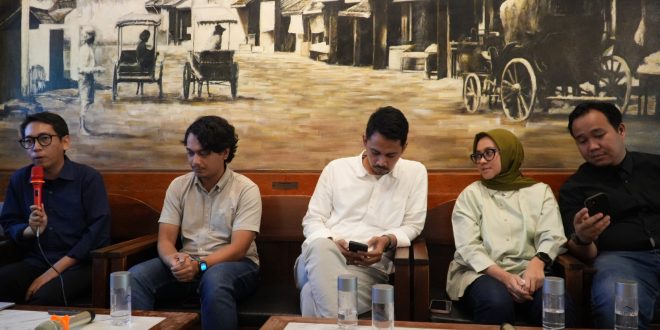The Constitutional Court (MK) rejected the Presidential Election Results Dispute (PHPU Pilpres) application submitted by the presidential (capres) and vice presidential (cawapres) candidate pairs Anies Baswedan-Muhaimin Iskandar (AMIN) and Ganjar Pranowo-Mahfud MD. The Constitutional Court, through Decision Number 1/PHPU.PRES-XXII/2024 and Decision Number 2/PHPU.PRES-XXII/2024, considers that both applications are entirely groundless according to law.
In this decision, three judges, namely Saldi Isra, Enny Nurbaningsih, and Arief Hidayat, submitted different opinions or dissenting opinions. Saldi Isra believes that the distribution of social assistance ahead of the election is correlated with electoral interests. Enny believes that there has been a lack of neutrality among officials related to the provision of social assistance in several regions. Meanwhile, Arief Hidayat said there were allegations of strong intervention from the executive power in the 2024 presidential election.
Responding to the dynamics of the PHPU presidential election, the Association for Elections and Democracy (Perludem) considers the MK to still be a calculator court because it still focuses on the difference in votes in its legal considerations. Perludem researcher Kahfi Adlan Hafidz assessed that the judge looked more deeply into the difference in vote results than the quality of the evidence and the applicant’s arguments.
“The distribution of social assistance then had a big impact on the electability of certain candidates, but that was not taken into consideration. “Then it is considered not a violation that affects the results,” said Kahfi at the launch of the PHPU monitoring results for the presidential election in the Cikini area, Central Jakarta (24/4).
Kahfi also showed that many Amicus Curiae, or friends of the court, were proposed by a number of academics, political figures, and civil society but were not taken into consideration in decisions, especially in legal considerations. He also noted that the 2024 Presidential Election PHPU was the largest decision ordering the correction of legal gaps in the Election Law.
The Court grouped the petition issues into six issue clusters, including the independence of election organizers, the validity of Gibran’s candidacy, social assistance, the neutrality of the State Civil Apparatus (ASN), election administration procedures, and the use of the Electronic Recapitulation Information System (Sirekap). Kahfi highlighted the issue of the politicization of social assistance. In its considerations and decisions, the Constitutional Court considered that the planning and distribution of social assistance was a legally valid action because there were regulations underlying it.
“The Constitutional Court does not want to enter into the authorities of other institutions, even though this is actually very related to election disputes,” said Kahfi.
Furthermore, the Constitutional Court saw that the applicant’s argument regarding social assistance and voter choice did not have a causal relationship between the distribution of social assistance and an increase in the vote share of one of the candidate pairs. Apart from that, the Constitutional Court also found no legal basis regarding the president’s non-neutrality, which resulted in the Prabowo-Gibran couple benefiting. This is because the parameters of the president’s non-neutrality in elections are not clearly regulated by law.
“So actually, the Constitutional Court is aware that there is a problem with the president’s non-neutrality, but there are no benchmarks, so the Constitutional Court declares that it has no legal grounds,” said Kahfi.
In his findings, Kahfi said, there were experts who were brought in to explain using an econometric approach that links social assistance, distribution areas, population, and candidate electability. According to him, the applicant actually wanted to answer the Constitutional Court’s challenge through quantity, but the Constitutional Court considered this evidence to be less than convincing.
Meanwhile, the Perudem Program Manager, Fadli Ramadhanil, assessed that the 14 working days for the Constitutional Court to receive, examine, and decide on PHPU cases for the Presidential Election were a very short time. As a result, the evidentiary process cannot be carried out in depth, so the evidence presented does not convince the judge.
Fadli gave an example regarding the politicization of social assistance; even though the judge felt there was a lack of evidence, he did not ask the applicant to add additional evidence. Fadli also views that the judge’s paradigm in the Presidential Election PHPU is inconsistent, even though the Constitutional Court once granted the Regional Election PHPU due to the politicization of social assistance carried out by the governor of South Sumatra.
Furthermore, Fadli presented the majority of the Constitutional Court judges’ considerations regarding ASN mobility and President Jokowi’s nepotism, stating that this could not be proven. He considers the Constitutional Court to have turned a blind eye to Gibran’s problematic candidacy from the start, even though the decision of the Honorary Council of the Constitutional Court (MKMK) and the Honorary Council of Election Organizers (DKPP) stated that there were ethical violations in Gibran’s nomination as vice presidential candidate.
“In my opinion, there is a problem with the approach to assessing the quality of evidence in a very short time,” said Fadli.
Responding to this, the Executive Director, Perludem Khoirunnisa Nur Agustyati, stated that the large number of Amicus Curiae and the existence of dissenting opinions showed that the 2024 election had many problems. He emphasized that the recommendations in the MK’s dissenting opinion were important to use as a record for the implementation of the next election. Ninis hopes that the notes from the Constitutional Court will become a priority discussion that will be completed long before the 2029 elections.
“So it is important to make recommendations for change right now; this is the momentum,” said Ninis.
Based on the Lucudem Monitoring, at least the Constitutional Court ordered related parties regarding the paradigm of neutrality of executive power, special rules regarding the distribution of social assistance close to elections, and regulated restrictions on the use of government funds and programs for personal interests. Apart from that, the Constitutional Court also ordered improvements to the Election Law, the Regional Election Law, and the legal regulations governing campaigns and election administrative violations, as well as clear rules for officials who hold concurrent positions as public officials and as campaign teams.
Meanwhile, for Bawaslu, the Constitutional Court ordered the establishment of operational standards and procedures—standard procedures for taking action against election violations committed before, during, and after the campaign. This is necessary so that Bawaslu obtains conclusions that have a strong and comprehensive basis. []
 Rumah Pemilu Indonesia Election Portal
Rumah Pemilu Indonesia Election Portal




